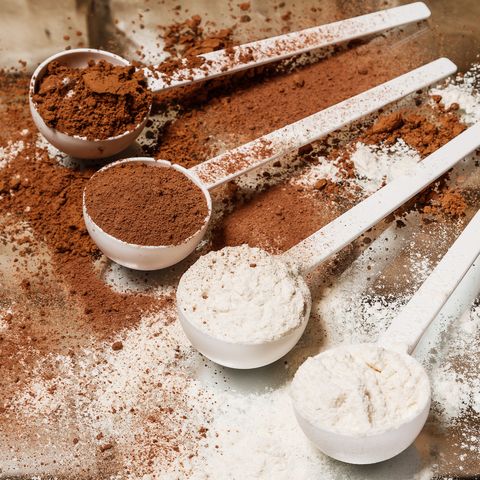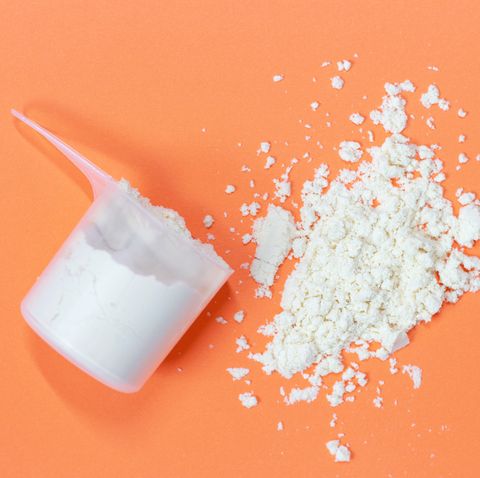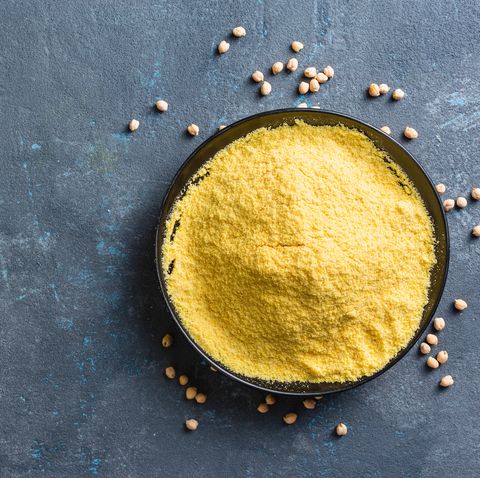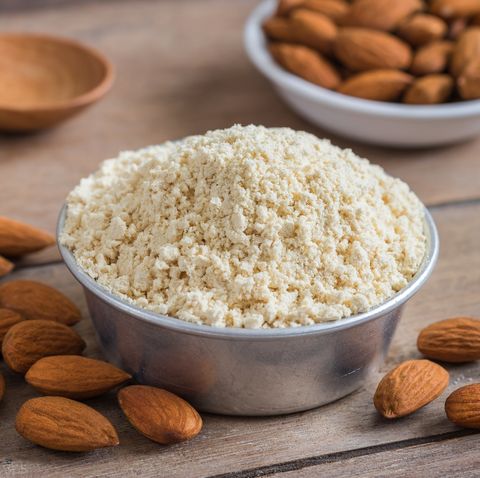Home » Diet & Food » Here\u2019s How to Know If You\u2019re Buying the Right Kind of Protein Powder
Here\u2019s How to Know If You\u2019re Buying the Right Kind of Protein Powder
Whey protein powder, casein protein powder, collagen protein powder, pea protein powder, soy protein powder, and—yes—even almond protein powder—with so many types of protein supplements on the market, it’s easy to understand why people are confused about which kind to buy.
As a registered dietitian, I answer plenty of questions from my clients about protein powders, especially now that you can buy a whole range of options online and at the grocery store.
Now the questions I’m fielding from my clients have shifted from “Am I getting enough protein?” to “Which protein powder is the best? Which tastes the best? Which has the least amount of fillers?” and also occasionally, “Will any of them help with the gainzzzzz?”
And from what I’m seeing the landscape of what’s popular in the world of protein powder is shifting. While whey and casein protein powders still reign supreme among the loyalists, plant-based options are gaining in popularity.
What’s most important, regardless of protein type, is making sure to choose high-quality options. One general way to ensure quality is to look for protein powder products that feature a “Informed Choice for Sport” or “NSF-certified for Sport” certifications on their label or websites.

While these certifications aren’t the only measurements of quality, you can be assured products that feature one deliver what’s advertised on the label and have been tested for banned substances such as anabolic steroids and prescription drugs.
In terms of what to look for specifically between many different types of protein powders, let’s break it down.
Best All-Around: Whey Protein Powder
Whey protein is found naturally in milk.

Based on decades of evidence, whey protein continues to stand out as a muscle-building tool due to its amino acid content. Whey is a complete protein—meaning that it has all the essential amino acids—making it a convenient, quality option.
One of whey protein’s ‘secret weapons’ is that “it is high in the amino acid leucine, which research continues to suggest maximally stimulates muscle protein repair after training,” says Kelly Jones, M.S., R.D., C.S.S.D.
In terms of taste, unflavored whey protein powder, it also has a neutral flavor that mixes well with anything, whether it be smoothies, in oatmeal or to boost the protein of a typical baked good.
One con: “Some people report gastrointestinal discomfort with standard doses of whey isolate, even if they typically tolerate dairy. In that case, I’d recommend another option.”
Here are Men’s Health‘s 12 best whey protein powders.
Best for Bedtime: Casein Protein Powder
Like whey, casein is a component of dairy—about 80 percent of milk is casein, while the other 20 percent is whey.

Casein is also a complete protein and hangs its hat on the fact that it’s more slowly absorbed than whey protein. Why does that matter?
Several studies have demonstrated that consuming pre-sleep protein may increase protein synthesis during sleep. That includes a 2015 study by Dr. Tim Snijders at Maastricht University where researchers gave some subjects a pre-sleep protein shake with 27.5 grams of a casein-based protein.
The scientists found that the casein-protein-before-bed-group gained significantly more muscle strength and size than the group that did not get the same protein.
I like Ascent Chocolate Micellar Protein.
Best for Vegans: Pea Protein Powder
Pea protein has emerged as one of the premier vegan options when it comes to supplements. But is it also as good as some other options? Maybe.

As stated in this Men’s Health article, pea protein powder isn’t often made with the little green peas you’re used to, but with yellow, split-pea beans, which you may more closely associate with pea soup.
“While more research is needed, recent studies have shown it to be just as effective as whey for stimulating muscle growth after both resistance and endurance training,” says Jones.
For this reason, if you’re looking for a vegan protein source, pea protein is a good buy.
Another Best for Vegans: Soy Protein Powder
The OG of vegan protein powders, soy protein quickly fell from grace after the rumors spread that soy caused testosterone to plummet. Science has not supported this nonsense.
One 2018 study published in Scientific Reports found that consuming soy protein did not significantly alter hormone status. Further, data have found similar outcomes when it comes to the effects of soy protein in producing similar gains in strength and lean body mass in response to resistance training to animal-based protein options.
NOW Sports Soy Protein Isolate Powder is my favorite.
Best for No-Cow (Or Bull): Almond Protein Powder
This is one of the new kids on the block and distinct in that it’s made with one ingredient: almonds.

If dairy doesn’t agree with you and/or you’ve tried other vegan options and been unimpressed by their taste, almond protein powder might be your thing.
One serving usually packs about 20 grams of plant-based protein, and has the bonus of naturally occurring fiber and calcium. It’s also versatile and blends well into smoothies or to give a nice protein boost (and flavor) to oats, baked goods, or the like.
My favorite: Bob’s Red Mill Almond Protein Powder
Best for Supplement Companies: Collagen Protein Powder
Collagen is protein’s golden child of the last several years, it seems like this stuff is in every pill, powder, and potion you find in the supplement section.
Collagen is actually a protein that binds togethers tissues in fish and animals (think of it as your body’s scaffolding). So it goes that collagen supplement manufacturers argue that taking collagen in supplement form can enhance your hair, skin, joints, and muscles.
But what does the science say? First, collagen supplements are not the same thing as collagen. Collagen supplements comes in the form of collagen peptides, which are not a complete protein.
And collagen peptides, by themselves, are not beneficial for muscle repair, because the body needs all essential aminos for this to occur.
And the joint and skin claims? While there exists research on the benefits in those departments of consuming collagen peptides, much of the science is industry funded. We need more, good, unbiased research to determine any possible effect.
Disclosure: Chris has consulted with NOW Foods in the past.
Source: Read Full Article
-
 11 Martha Stewart Recipes That Are Perfect for Spring
Apr 7, 2021
11 Martha Stewart Recipes That Are Perfect for Spring
Apr 7, 2021 -
 Starbucks Is Giving Away 2.5 Million Prizes This Holiday Season
Nov 30, 2020
Starbucks Is Giving Away 2.5 Million Prizes This Holiday Season
Nov 30, 2020 -
 This Costco Treat Tower With 7lbs Of Goodies Is The Perfect Last Minute Holiday Gift
Dec 11, 2021
This Costco Treat Tower With 7lbs Of Goodies Is The Perfect Last Minute Holiday Gift
Dec 11, 2021 -
 A-Rod Just Showed Off His 2021 Weight Loss Transformation
Apr 29, 2021
A-Rod Just Showed Off His 2021 Weight Loss Transformation
Apr 29, 2021